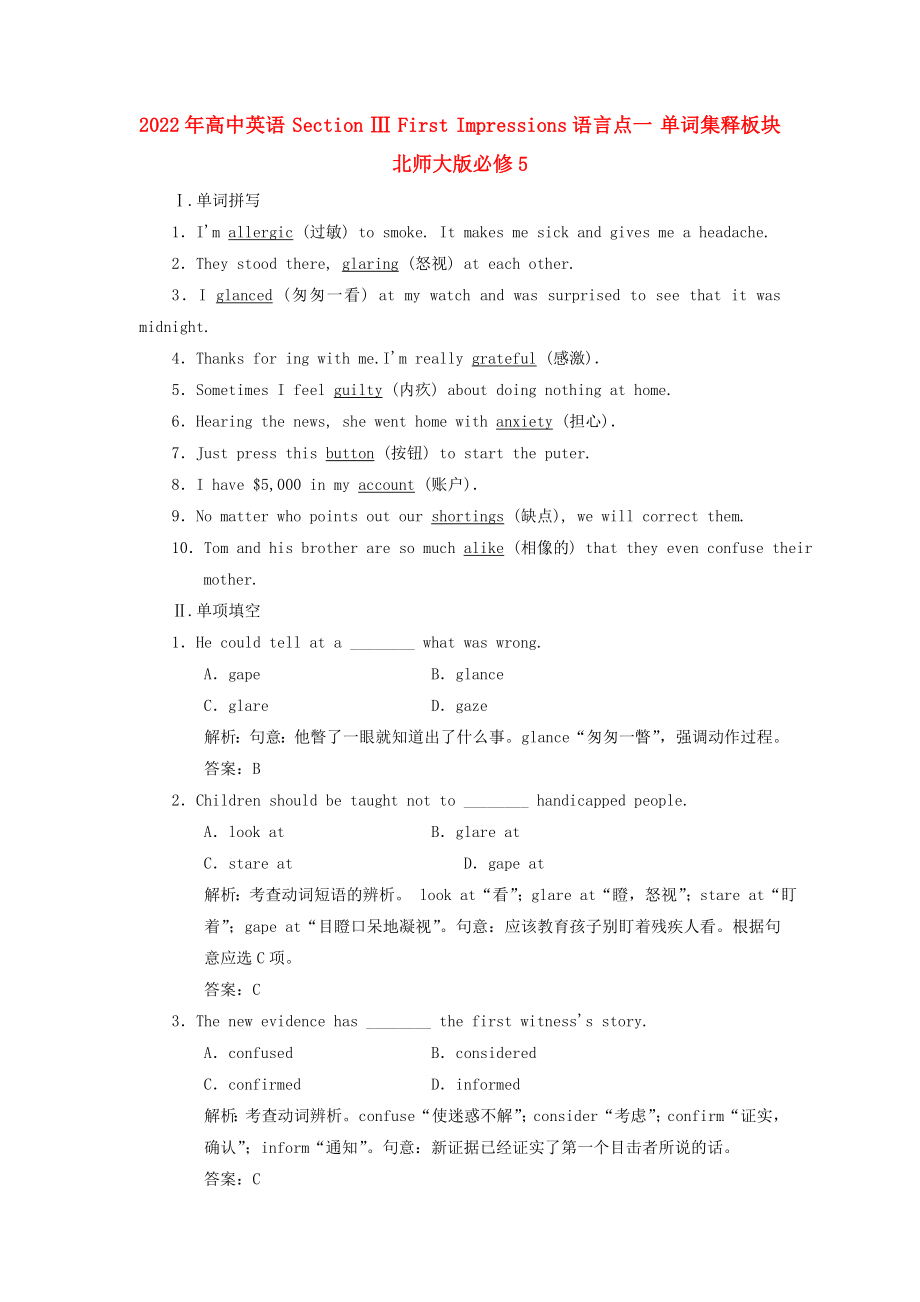《2022年高中英語(yǔ) Section Ⅲ First Impressions語(yǔ)言點(diǎn)一 單詞集釋板塊 北師大版必修5》由會(huì)員分享����,可在線閱讀,更多相關(guān)《2022年高中英語(yǔ) Section Ⅲ First Impressions語(yǔ)言點(diǎn)一 單詞集釋板塊 北師大版必修5(2頁(yè)珍藏版)》請(qǐng)?jiān)谘b配圖網(wǎng)上搜索��。
1��、2022年高中英語(yǔ) Section Ⅲ First Impressions語(yǔ)言點(diǎn)一 單詞集釋板塊 北師大版必修5
Ⅰ.單詞拼寫
1.I'm allergic (過(guò)敏) to smoke. It makes me sick and gives me a headache.
2.They stood there, glaring (怒視) at each other.
3.I glanced (匆匆一看) at my watch and was surprised to see that it was midnight.
4.Thanks for ing with me.I'm rea
2���、lly grateful (感激).
5.Sometimes I feel guilty (內(nèi)疚) about doing nothing at home.
6.Hearing the news, she went home with anxiety (擔(dān)心).
7.Just press this button (按鈕) to start the puter.
8.I have $5,000 in my account (賬戶).
9.No matter who points out our shortings (缺點(diǎn)), we will correct them.
10.Tom
3���、and his brother are so much alike (相像的) that they even confuse their mother.
Ⅱ.單項(xiàng)填空
1.He could tell at a ________ what was wrong.
A.gape B.glance
C.glare D.gaze
解析:句意:他瞥了一眼就知道出了什么事。glance“匆匆一瞥”��,強(qiáng)調(diào)動(dòng)作過(guò)程�����。
答案:B
2.Children should be taught not to ________ handicapped people.
A.look
4�����、 at B.glare at
C.stare at D.gape at
解析:考查動(dòng)詞短語(yǔ)的辨析��。 look at“看”;glare at“瞪���,怒視”���;stare at“盯著”;gape at“目瞪口呆地凝視”��。句意:應(yīng)該教育孩子別盯著殘疾人看�����。根據(jù)句意應(yīng)選C項(xiàng)����。
答案:C
3.The new evidence has ________ the first witness's story.
A.confused B.considered
C.confirmed D.informed
解析:考查動(dòng)詞辨析。confuse“使迷惑不解”�;co
5、nsider“考慮”��;confirm“證實(shí)��,確認(rèn)”�����;inform“通知”。句意:新證據(jù)已經(jīng)證實(shí)了第一個(gè)目擊者所說(shuō)的話�����。
答案:C
4.She was grateful ________ Tom ________ all that he had done.
A.for; to B.to; for
C.for; for D.to; to
解析:be grateful to sb. for sth.“因某事而感激某人”�。
答案:B
5.All his ________ makes him look quite old.
A.a(chǎn)nxiety B.we
6���、alth
C.pleasure D.effort
解析:句意:他所有的焦慮使得他看起來(lái)更老了�����。anxiety“擔(dān)心����,焦慮”�����;wealth“財(cái)富”�;pleasure“快樂(lè)”;effort“努力”�����。
答案:A
6.Paul strongly denied that he was guilty ________ cheating innocent customers.
A.over B.a(chǎn)bout
C.of D.for
解析:句意:Paul極力否認(rèn)犯有欺騙無(wú)辜顧客罪。Be guilty
over/about/for ...“因……不安/內(nèi)疚”��;be guilty of“犯有……罪或過(guò)失”���。
答案:C
 2022年高中英語(yǔ) Section Ⅲ First Impressions語(yǔ)言點(diǎn)一 單詞集釋板塊 北師大版必修5
2022年高中英語(yǔ) Section Ⅲ First Impressions語(yǔ)言點(diǎn)一 單詞集釋板塊 北師大版必修5

